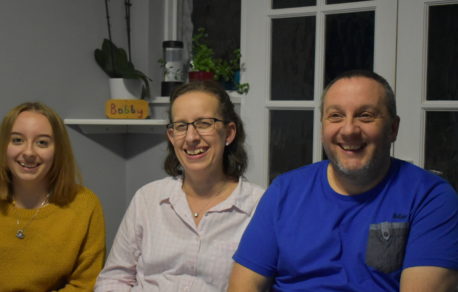
Understanding empathy: how to be kinder to others
In the second part of his 2-part blog series on empathy, cognitive behavioural hypnotherapist Andy Thornton explores the power of empathy – and how we can show empathy to others, even if we feel it doesn’t come naturally to us.
Being empathetic
In our first article on empathy we looked at the meaning of the word and the difference between empathy and sympathy. In this second article we are going to think about what it means to be empathetic towards other people.
To some extent most of us will, at one time or another, show empathy to someone else but some people are more naturally empathetic than others.
We probably all know someone who is always there to help and support others, who just seems to understand what is going on and always knows just what to say whatever the situation. These are the people that other people turn to in times of need. These are the empaths.
Are you an empath?
How can you tell if you are an empath? There are a number of signs that could indicate you are:
- You have a deep sense of other people’s pain and feel this as your own
- You can find frequent close contact hard work
- You have good intuition about people and situations
- You find yourself drawn to calming environments and nature
- You find crowded spaces uncomfortable
- You tend to care too much, even at the expense of your own wellbeing
- You seem to attract people who want to share their problems
- You can be very sensitive to things like sights, sounds or smells
- You need time out to rest and recharge
- You really don’t like conflict or arguments
- You are quiet, private and reserved
- You like to spend time alone
- You can find it difficult to set boundaries and say ‘no’ to people
When should you be empathetic?
Of course many of us are not, and probably don’t need to be, empaths. And yet we can all show empathy and be empathetic towards the people around us. But when should we do this?
Well, the simplest answer is that empathy has a place in any and every relationship or interaction we find ourselves in.
Whenever we are with other people there is a place for empathy. Being able and willing to step into someone else’s shoes for even a short time can dramatically change the dynamics of a relationship, be that at work, socially, or romantically.
Of course, we do need to be consciously aware of our own inner state and able to recognise if we are becoming overwhelmed by the emotions and needs of others at the expense of our own health.
Sometimes we may have to walk away and show ourselves some empathy, in order to be able to sustain our empathetic tendencies over the longer term.
It’s easy, isn’t it?
Shouldn’t it be easy to be empathetic? After all we are all social animals at heart and being able to build relationships and connect with other people should surely be a completely natural thing for us to do.
And yet being empathetic doesn’t come naturally to everyone, and even when it does that doesn’t mean it’s an easy thing to do.
Some possible blockers to empathy can come from:
- Childhood experiences
- How your own emotional needs were met (or not)
- What you learned about emotions and how important (or otherwise) they are
- Anxieties about becoming overwhelmed or caught up in other people’s emotions and traumas
Being deeply empathetic can be an exhausting business. You can find yourself expending your finite reserves of mental and emotional energy in being there for other people, and not then taking the time you need to recharge and replenish those reserves.
If you are not a natural empath, then to become empathetic means you have to consciously adapt your normal behaviour. You will have to make a conscious effort to behave in ways that are not usual for you. This too will require effort and might be difficult to sustain over a long period of time.
How can I become more empathetic?
While we won’t all be natural empaths, it is possible to develop your ability to be empathetic.
Like any skill it is something we can build up and improve with effort and conscious practice. And of course, with practice comes competence and things get easier.
These are a few of the ways in which we can develop our empathetic abilities:
Listen
Perhaps the most important aspect of being empathetic is really listening to the person in front of you. Not listening while inwardly thinking about other things, or formulating the next thing you plan to say, but really listening.
This involves giving all of your attention to the person talking and being aware of all the aspects of their communication, both verbal and non-verbal.
Deep listening like this will give you a fuller appreciation of the other person’s experiences and feelings.
Be curious
As you listen to what is being said it can be very helpful to stay curious about what you are hearing.
A sense of curiosity means you are more likely to help them explore their thoughts, feelings and emotions. You will also keep at bay any tendency to assume you know what they are going through without fully understanding it.
Provide time and space
Don’t rush. Our world is fast paced enough so when being empathetic it is important to slow down and really give people the time and space that they need to fully share what they are experiencing.
It can be hard sometimes to open up about things that we find difficult, so being shown patience and allowed to move forward at our own pace is essential.
Accept that you don’t know
No matter how well you know the person you are talking to, or how familiar you might be with the issues being talked about, you can never fully know what the experiences are of another person.
We are all unique, made up of all our history, upbringing, values, beliefs, successes, failures and so on. We can never truly know the whole back story of someone else, and very often we are not fully aware of how our own story influences the way we are in the world.
It can take considerable effort to keep reminding yourself that whatever you might assume to be happening, without direct confirmation you don’t really know.
Be aware of, and put aside, your own judgements and preconceptions
Nobody likes to think of themselves as prejudiced of course. But the truth is that we are all deeply influenced by the things we have seen, heard, experienced and been taught in life.
We can only view the world through the lens of our own lifetime and this, inevitably, gives us certain preconceptions, viewpoints, ideas about right or wrong and, yes, prejudices.
Taking the time to really understand and honestly evaluate how your personal world view might influence the way you react to different situations will make it easier for you to realise when your reactions to things you are being told might be less than empathetic.
Avoid the urge to fix
One common trap that highly empathetic people can fall into is feeling the need to ‘fix’ whatever is going on that is causing distress in others.
No matter how much we care and empathise someone else’s life is not ours to ‘fix’ and most often the best thing we can do is help them to find the solutions that might exist within their own lives.
A word of caution…
And finally, be careful not to take on the burdens of other people. While being empathetic means you are able to feel what others are going through you do not need to take those things on as your own.
It does not help if in your efforts to help someone else you fully absorb their problems as your own, that simply results in both of you having problems and it is very difficult to help someone when you end up being as much in need of help as they are.
In fact, if you take on too much from other people you run a high risk of mental and emotional burn out which can then take a considerable time to recover from.
Remember, being effectively empathetic means having the ability to be effectively self-empathetic first.
When life gets busy, it can be easy to forget to take care of yourself. Join our free Wellbeing Hub for expert advice, information and resources to help you take control of your wellbeing, and live better every day.



